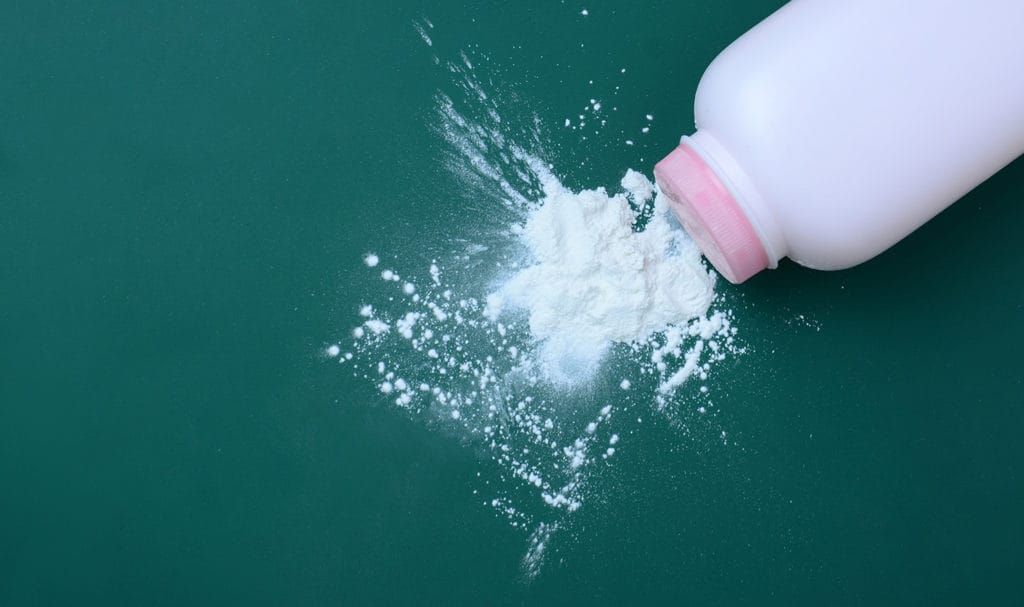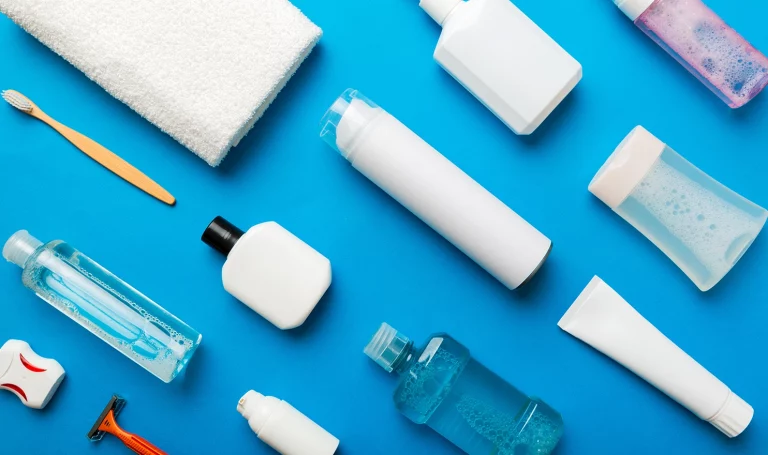In today’s day and age, we are constantly bombarded with attention-grabbing headlines and clickbait. Few things grab our attention like multibillion-dollar settlements.
Recently, one of the largest settlements in U.S. history was announced as Johnson & Johnson was ordered to pay a total of $4.69 billion after a jury sided with twenty-two women who claimed talcum powder (a key ingredient in their baby powder) caused ovarian cancer.
As awareness of toxic ingredients becomes increasingly mainstream, and consumers become more educated, small businesses and large corporations need to carefully consider how to protect themselves and their consumers by formulating safer products and making sure they have proper product liability protection in place.
Product liability insurance is one of the lesser-known insurance plans available, but it protects consumers, small business owners, and large corporations alike.
Troublesome Talcum
For over 100 years, Johnson & Johnson has touted their baby powder as so pure and gentle it was safe enough to be used on babies. It was an iconic product with an unmistakable smell used around the world, generating billions of dollars in revenue year over year.
The problem lay in the main ingredient, talcum powder, which is a mineral that was known for its softness. Plaintiffs argue this ingredient was contaminated with asbestos: a well-known carcinogen. There are over 38,000 pending talcum powder lawsuits, spanning many products outside of Johnson & Johnson’s baby powder.
Though the company denies responsibility for their product causing cancer, they pulled talc-based baby powder from the shelf in the U.S. market in 2020 and will stop selling it globally this year. They will still sell baby powder, but the talcum powder has been replaced with corn starch.

Product Injuries & Damages Are Linked To A Majority Of The Largest Settlements In History
So just how big was the Johnson & Johnson settlement in comparison to other large settlements? So big in fact there are only four other settlements that outrank it—including the largest U.S. settlement in history, the infamous $206 billion tobacco settlement. Also worth noting, of the top ten largest U.S. settlements, four of these settlements were centered around harmful ingredients or products that caused bodily injury.
Bodily injury, as defined by most product liability insurance policies, means “bodily injury, sickness or disease sustained by a person, including death resulting from any of these at any time.” Another liability exposure for those who sell, or manufacture products is physical damage that may be caused by the product. Physical damage is “physical injury to tangible property, including all resulting loss of use of that property.”
These two exposures combined account for the majority of the top ten largest settlements in U.S. history. Given this information, it is easy to see the importance of understanding what product liability insurance is and how it protects individuals and entities.
Your Best Defense In A Class Action Lawsuit Is Product Liability Insurance
When most people think of insurance, they think of auto insurance or homeowners’ insurance. Some small business owners may be familiar with other types of insurance often classified as commercial insurance because it is typically one of the first steps required to start a business.
Commercial insurance is a general term that can refer to property insurance, workers’ compensation insurance, general liability insurance, and product liability insurance. Many people understand the need to protect their property, but often times product liability insurance is overlooked until someone is faced with a potential claim or lawsuit.
Of the many exposures faced by an insured, product liability is perhaps one of the largest and most underestimated as it can often lead to a class action lawsuit. As society continues to evolve and adopts a more litigious approach, the need to ensure that businesses and individuals have proper protections in place becomes ever more important.
One important benefit of a product liability insurance policy is the duty of an insurance company to defend the insured. These defense costs are included within the limits of most policies. This coverage can be crucial in the event of a class action lawsuit because defense costs can quickly add up and exceed millions of dollars.
As evident in the Johnson & Johnson settlement, one ingredient can lead to injuries or claims that can evolve into a class action lawsuit, which can lead to damages and settlements exceeding billions of dollars.

Ingredients Affect Insurance Eligibility
There are many resources that small businesses can turn to when formulating products such as skin care products or cosmetics, but one often overlooked resource is their insurance company. As insurance companies are called upon to defend their insureds, they acquire vast knowledge and often begin to see emerging trends or common areas of concern with certain ingredients.
Insurance companies will oftentimes specialize in particular types of products or areas where they have become industry experts and have a deep understanding of the common exposures faced. For example, an insurance company that focuses on product liability for CBD insurance, cosmetics, or skin care products will likely have a list of products or exclusions that are known to cause bodily harm or disease.
Some examples of ingredients that are known to cause bodily injury and thus will be excluded from most product liability insurance policies include formaldehyde, silica, carcinogens, and lead. The negative effects of most of these ingredients have been well documented and have resulted in many high-profile settlements over the years.
Certain Ingredient-Free Products Are On The Rise
Other ingredients are just now beginning to raise concerns about potential health effects such as parabens and phthalates. These are both man-made ingredients that were commonplace in cosmetics and skincare products for many years.
Though there is ongoing research to determine how harmful these products may be, many insurance companies are weary of products that contain these ingredients and they have been the target of many consumer watch agencies. As a result, well-informed consumers are increasingly demanding products that are paraben and phthalate-free.

Follow Consumer Trends & Concerns
You can imagine insurance companies need to be well-informed about ingredients that lead to potential consumer harm. As an underwriter of one of the leading cosmetic programs in the country for small business product liability insurance, we are constantly on the lookout for emerging trends or the discovery of new potentially harmful ingredients.
Underwriters work closely with insurance companies to bring awareness to harmful ingredients to protect the insured by notifying them of the hazards associated with formulating products that contain such ingredients. We regularly review current and past litigation involving product liability insurance claims. We also stay up to date on any product recalls that have been issued on products that have already hit the market.
While protecting the insured and the consumer is important, it is also necessary for an insurance company to protect itself by adding exclusions for ingredients that may lead to costly claims.
One example of a new exclusion that is being added to our beauty product liability insurance policy is the exclusion of Perfluoroalkyl or Polyfluoroalkyl substances—more commonly referred to as PFAS or “forever chemicals.”
According to the EPA, forever chemicals include a family of widely used, long-lasting chemicals consisting of components that break down very slowly over time. The extreme length of time that it takes for these chemicals to break down, compounded with their widespread use in products means that varying amounts of PFAS are found in the blood of people and animals all over the world.
There are a number of scientific studies that have shown that exposure to these chemicals may lead to harmful effects in both humans and animals. There are also legitimate concerns that these chemicals are harmful to the environment and can easily contaminate air, water, and soil, which could lead to more claims.

Protect Your Products, Protect Your Consumers
High-profile cases such as the Johnson & Johnson settlement provide an opportunity for an industry to adjust and implement a safer approach to product formulation. It is important for all those involved in the industry to be vigilant and proactive when formulating new products. It is also critical, that as we discover harmful ingredients, we take quick action to minimize the negative consequences of such ingredients by removing them from the shelves and notifying the public of possible concerns.
Businesses can help protect themselves and consumers by relying on the vast knowledge insurance companies have compiled over years of research and litigation to develop safe products and avoid harmful additives. Insurance companies can be used as a reference to bring awareness to unsafe products and ingredients while providing protection for insureds in the form of product liability coverage.
Manufacturers, government agencies, small businesses, and insurance companies will continue to play an ever-increasing role in protecting consumers.
If you have questions about the information provided, or have other insurance questions, please contact an Insurance Canopy representative at 844.520.6993.
All policies have limitations, conditions, and exclusions. Please refer to your policy for exact coverages.





